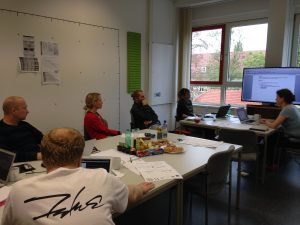For Visit 16, the main design phase of the project, MinD colleagues met at the Alexianer Hospital in Berlin and at TU Dresden. The guest researchers and various hosting colleagues worked together on the development of design proposals in response to three ‘transition areas’ – areas where people with dementia and their carers are most concerned with adapting to change and which had been derived from data analysis in prior secondments. Each transition area covers different potential options to increase wellbeing and social interaction of people with dementia.
In the first week, 14 design ideas were developed and prepared for presentation in posters, offering a visualisation as well as participant quotes and descriptions of the designs, which had been translated into German for the local experts. An expert workshop with local medical and healthcare staff was held in order to gain feedback and advice on the suitability and other aspects of the 14 design ideas.
For the second week, the MinD team established a number of criteria to help with assessing the relevance, significance and feasibility of the design ideas to help with selecting the most promising ideas for further development. Four of the design proposals were selected for further refinement: two of them have an emphasis on changing routines and communication in order to allow for more mindfulness in dementia care, and two of them are more experimental and technologically challenging. One example is a personalised »guide to my future (self)« which contains self-help guidance and exercises for managing life with dementia. Another example is a smart device, which helps people with dementia to focus on conversation partners when taking part in social events.
The four design proposals have been developed and documented to allow better understanding of the ideas. This will be valuable for further assessment by experts in the following secondments, where further selections will have to be made.

